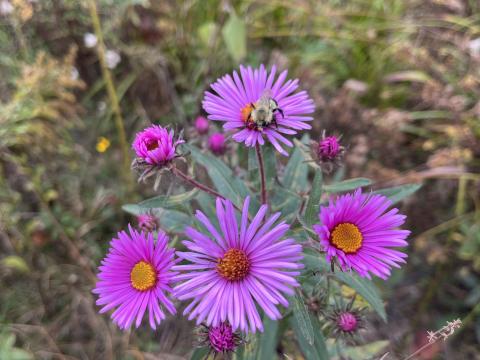UNH Alum Catherine Coverdale Finds Career with Participatory Science

Permanent pollinator habitat on a farm
Catherine Coverdale (’21, ’23G) is the state’s Pollinator Conservation and IPM Specialist with the Xerces Society for Invertebrate Conservation. She also serves as a National Resource Conservation Service (USDA-NRCS) Partner Biologist. As a lifelong New Hampshirite, Catherine sought opportunities to engage with the local community in meaningful, impactful ways during her graduate and undergraduate studies at the University of New Hampshire. Through internships with UNH Extension during her time as an undergraduate student, and opportunities to connect with local farmers during her own graduate research, she saw how community participation can result in actual change supported by the community itself. When GRAD834, Fundamentals of Citizen and Community Science, graduate course was offered for the first time, Catherine immediately signed up.

Catherine Coverdale (’21, ’23G)
Taught by Malin Clyde (UNH Extension) and Dr. Alyson Eberhardt (NH Sea Grant, UNH Extension), the course offered opportunities for Catherine and other students to explore what makes for a successful and effective participatory science project. “GRAD 834 continues to feel like the most applicable course to my current work,” Catherine said. She was invigorated to go to class and to “be amongst others who cared about their communities.” She felt that her classmates all wanted to make positive change in the world. The course taught Catherine the importance of fostering trust and respect with communities in order for positive change to occur.

Common eastern bumble bee (Bombus impatients) on New England aster
When looking for jobs after earning her master's degree, Catherine sought opportunities to continue working with local farmers in New Hampshire. With the Xerces Society, Catherine designs and manages habitat for pollinators and consults with local farmers to improve pest management techniques using environmentally conscious integrated pest management (IPM) methods and conservation biological control.
For these techniques to be used by farmers, a strong relationship of trust between practitioners and researchers needs to exist. The IPM Working Group helps build this engaged community, bringing together the NRCS, UNH Extension, local farmers, local technical service providers, the NH Department of Agriculture, and County Conservation District members. A few times a year, this group gathers to discuss issues farmers are facing, and how to reduce the impacts of pest pressure on crop producers. With the information from this working group, Catherine can help shape NRCS program offerings to better serve local farmers and their current needs.
In these meetings, Catherine has seen the importance of having engaged local farmers at the table. These early adopters of new strategies go on to tell their network of producers about new methods for pest mitigation, and this is how change spreads. When it comes from a neighbor, a colleague, or a friend, other farmers are more likely to try new methods, which will then make these methods more successful.

NRCS planting in late August
Catherine’s current work is about being a bridge for local communities to the resources they need, specifically people working on the land. Many of the local farmers are what Catherine referred to as “land stewards”, leasing their farms rather than owning the land outright. Understanding this dynamic allows Catherine and other partners to develop IPM strategies that are cost-effective and applicable to this community of growers. In the coming months, Catherine will work with Amber Vinchesi-Vahl, UNH Extension Entomology and IPM State Specialist, to deliver on-farm demonstrations of codling moth mating disruption methods. Catherine is seeing the impact of her work first-hand, and helping bring people together to build new partnerships, expand farmer networks, and explore new opportunities for sustainable farming in New Hampshire.
About the Author: Mairi Poisson (she/her) is a PhD student in the UNH Natural Resources and Earth System Sciences program. She studies the impacts of human development on wildlife. After taking GRAD 834: Foundations of Citizen and Community Science, Mairi became more involved with the efforts of the UNH Participatory Science Working Group where she now provides support for advancing participatory science efforts at UNH.
